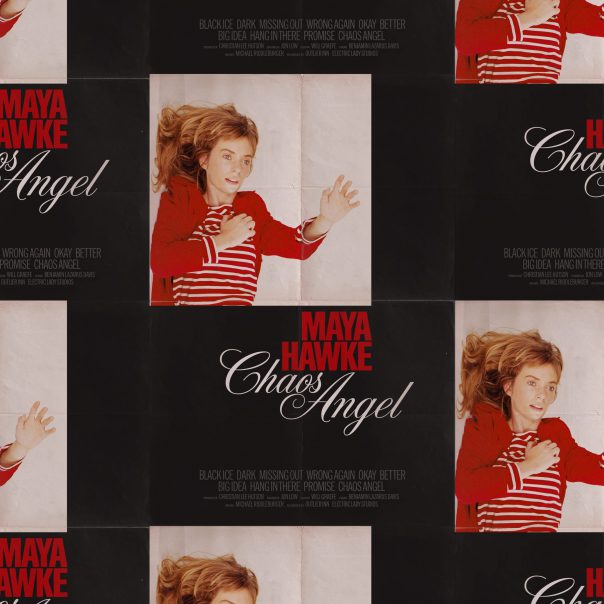ALBUM REVIEW: Maya Hawke embraces the havoc on ‘Chaos Angel’

Maya Hawke, “Chaos Angel.”
Maya Hawke delves deep on her third album, Chaos Angel. Showcasing the singer-songwriter’s ability to articulate the pains of coming of age and finding herself in relationships with others and herself, the album has her finding purpose in the midst of it all.
Chaos Angel
Maya Hawke
Mom+Pop, May 31
8/10
Get the album on Amazon Music.
The 25-year-old daughter of Ethan Hawke and Uma Thurman has made her mark in modeling before moving on to acting and music. In this space, her biggest strength is songwriting. It originated with her love of poetry, which has blossomed throughout as a music artist. She showed it on 2020’s Blush, and it evolved exponentially since.
Hawke has described the concept of Chaos Angel as being about an angel sent to Earth to do good but unintentionally causing havoc and destruction in its wake, a la “Amelia Bedelia”—running away, only to return and realize that chaos sparks change.
Opener “Black Ice” begins with a recorded message: “The angel in human form; does that make sense when we put it that way?” There’s a barely audible “yeah,” as the song breaks into mellow guitar playing.
The album has moments that are quite ballad-like. The bittersweet piano and soft string melodies on the title track might lull listeners, before the song gradually incorporates a steady beat and accompanying background vocals. Hawke’s take on the melodrama of the human experience is felt with the tweak of a sudden minor key, pause or rawness of her singing.
It’s most prominent on the second track, “Dark,” about a love story gone wrong. “Tried to let you forget me but my Celtic cross was heavy,” Hawke cries with a cracked voice on the self-proclaimed “cut and dry” medley. The song is, like others here, minimalistic in its approach in order to allow the emotion in Hawke’s voice to break through and resonate. The uneasiness in the vocals sets the scene for the anxiety that comes with the unchartered territory in loving someone new.
The unexpected continues on “Promise,” an acoustic piece that has Maya Hawke singing alongside a guitar at first, with a mellow keyboard coming in until she chants, “I’ll love you as much as possible until I wanna stop.” That’s interrupted by her hearty laugh. It’s a welcome break in the music; these touches make each song unique, while depicting that emotions and feelings – just as art itself – are not linear.
“Better” also shifts gears, with Hawke’s carefully pitch-shifted vocals jumping in from the get-go with nothing but a colorful chorus of background singing, equally distorted, accompanying her. It’s a short but sweet interlude of sorts that joyfully reminds you that things will be better in the morning. “Big Idea” is a warm folk-country number that shows Hawke’s witty songwriting skills. “I brought poppy seeds to a gunfight,” she croons.
The mood isn’t always so somber. Despite the sometimes somber subject matter, on “Missing Out,” for example, she tells of showing up at a university despite not being a student there. The song covers hopes and dreams for a future with others. Sonically folky and upbeat, it’s brimming with optimism and happiness. “Now I know it’s me who’s missing out/ But I was born with my foot in the door/ And my mind in the gutter and my guts on the floor,” she sings.
A reminder of what it means to be human, and the mistakes that come along with it, are beautifully portrayed on “Okay.” “If you’re OK, then I’m OK,” she repeats many times as the soft, lingering percussion and slow guitar playing suddenly, mid-song, break with a shriek to an electric guitar solo.
Through the uncertainty, Hawke still manages to have moments of empowerment, particularly on folk-country tune “Hang In There,” where she tells herself, in the wake of getting out of an abusive relationship, “Break down the backlash that he put you through/ What happened to you is not who you are.” Ultimately, this is the most poignant message of Chaos Angel. Despite the errors of our ways and the fear of the unknown, we can accept that what will come is meant for us and can move on with our lives.
Follow writer Vera Maksymiuk at Twitter.com/veramaksymiuk.
